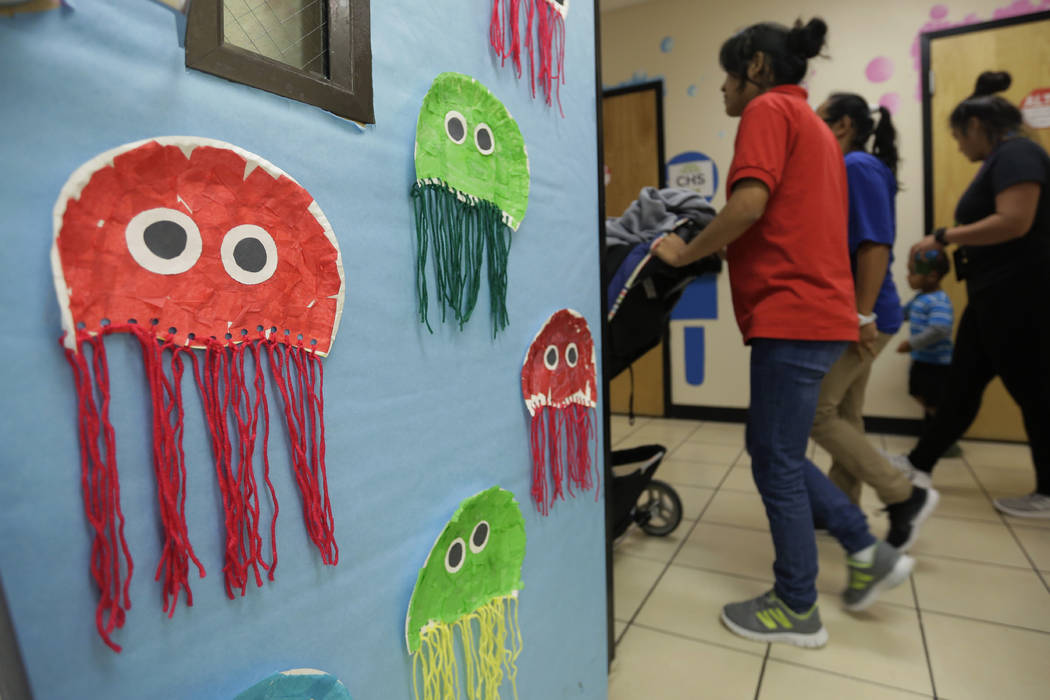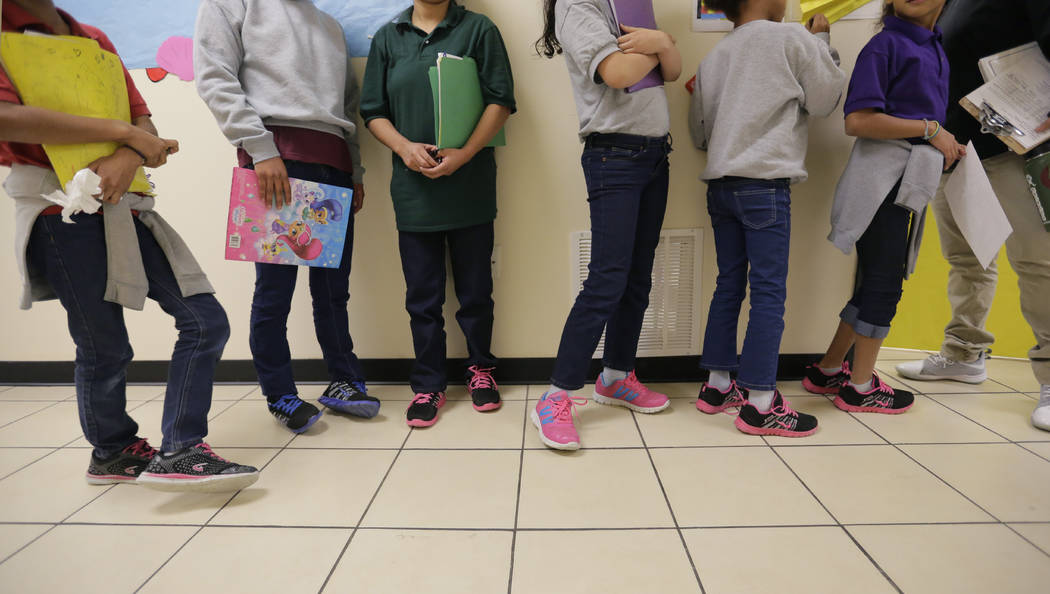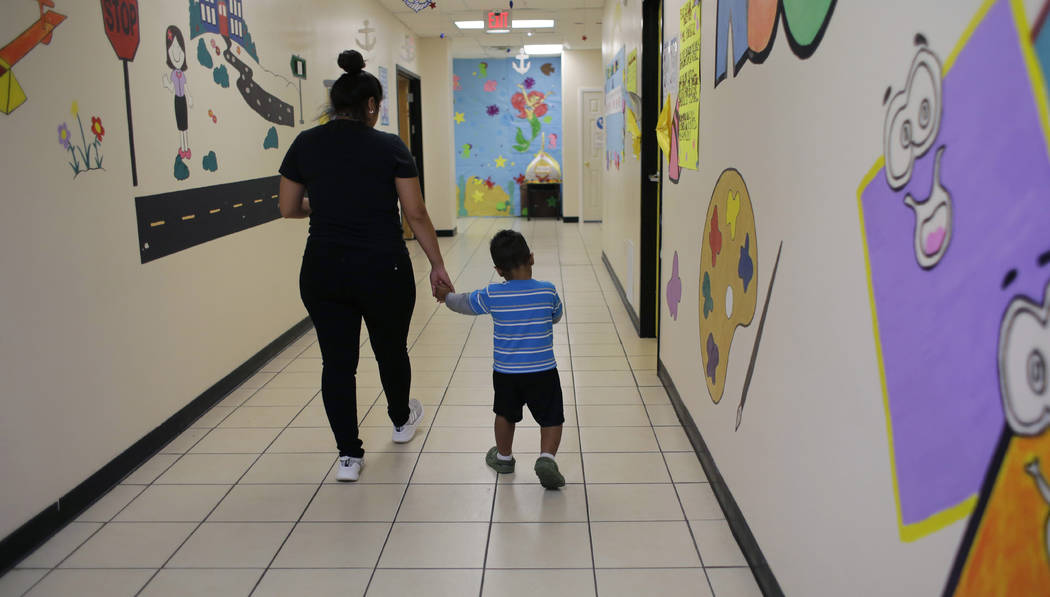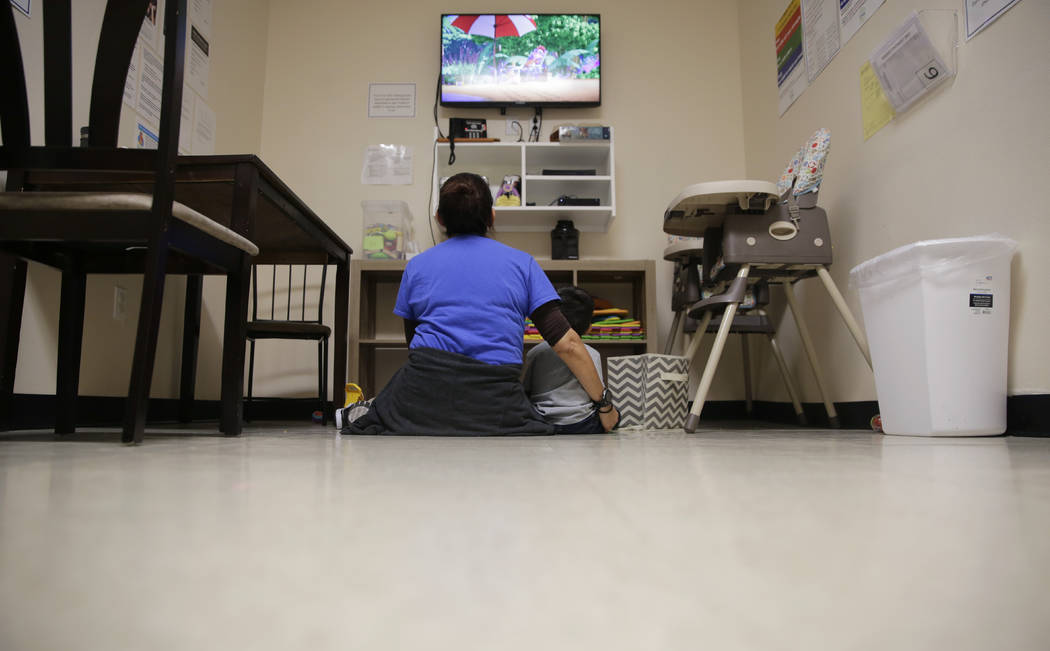Trump administration shifting to privatize migrant child detention
SAN BENITO, Texas — On a recent day in a remodeled brick church in the Rio Grande Valley, a caregiver tried to soothe a toddler, offering him a sippy cup. The adult knew next to nothing about the little 3-year-old whose few baby words appeared to be Portuguese. Shelter staff had tried desperately to find his family, calling the Brazilian consulate and searching Facebook.
Nearby, infants in strollers were rolled through the building, pushed by workers in bright blue shirts lettered “CHS,” short for Comprehensive Health Services, Inc., the private, for-profit company paid by the U.S. government to hold some of the smallest migrant children.
Sheltering migrant children has become a growing business for the Florida-based government contractor. More than 50 babies, toddlers and teens were closely watched on this day inside this clean, well-lit shelter surrounded by chain link fences.
A joint investigation by The Associated Press and FRONTLINE has found that the Trump administration has started shifting some of the caretaking of migrant children from mostly religious-based nonprofits to private, for-profit contractors.
So far, the only private company caring for migrant children is CHS, owned by beltway contractor Caliburn International Corp. In June, CHS held more than 20% of all migrant children in government custody. And even as the number of children has declined, the company’s federal funding for their care has continued to flow. That’s partly because CHS is still staffing a large Florida facility with 2,000 workers even though the last children left in August.
Trump administration officials say CHS is keeping the Florida shelter on standby and that they’re focused on the quality of care contractors can provide, not about who profits from the work.
“It’s not something that sits with me morally as a problem,” said Jonathan Hayes, director of the Department of Health and Human Service’s Office of Refugee Resettlement. “We’re not paying them more just because they’re for-profit.”
Kelly on Caliburn board
Former White House Chief of Staff John Kelly joined Caliburn’s board this spring after stepping down from decades of government service; he joined the Trump administration as Secretary of Homeland Security, where he backed the idea of taking children from their parents at the border, saying it would discourage people from trying to immigrate or seek asylum.
Critics say this means Kelly now stands to financially benefit from a policy he helped create.
Houston Police Chief Art Acevedo said the retired general told him first-hand that he believed enforcing a “zero tolerance” policy would serve as a deterrent.
“What’s really the motivator, the deterrence or the dollar?” said Acevedo, who signed an Aug. 14, 2019, letter with dozens of law enforcement leaders asking Trump to minimize the detention of children. “I would question that if he’s getting one dollar for that association.”
Kelly did not respond to requests for comment. But in a statement, Caliburn’s President Jim Van Dusen said: “With four decades of military and humanitarian leadership, in-depth understanding of international affairs and knowledge of current economic drivers around the world, General Kelly is a strong strategic addition to our team.”
Earlier this year after leaving government, Kelly was widely criticized by activists who spotted him in a golf cart at Homestead. The facility was at least temporarily shut down in August after numerous lawmakers said holding that many children in a single facility was abusive.
CHS gets more business
Meanwhile, CHS was getting more business housing migrant children. Today it’s operating six shelters including three “tender age” shelters that can house the youngest, infants and toddlers, in the Rio Grande Valley. And the company has plans underway to run another 500 bed shelter in El Paso, the company said.
Melissa Aguilar, the executive director of CHS’s shelter care programs, said they’re not separating children, they’re caring for children.
“We’re doing the best that we possibly can,” she said. “The children are borrowed. They’re borrowed for our purpose, right? So a lot of times when something is borrowed, you take care of them better than you would something that is your own.”
Overall, the federal government spent a record $3.5 billion caring for migrant children over the past two years to run its shelters through both contracts and grants.
During that time, CHS rapidly moved into the business of caring for migrant children, an AP analysis of federal data found. In 2015, the company was paid $1.3 million in contracts to shelter migrant children, and so far this year the company has received almost $300 million in contracts to care for migrant kids, according to publicly available data. The company also operates some shelters under government grants.
So far this fiscal year, ORR funded 46 organizations running more than 165 shelters and foster programs to care for over 67,000 migrant children either separated from their parents or caregivers at the border, or who came to the U.S. on their own.
Obama faced issue
The Obama administration also grappled with how to handle large numbers of children crossing the border. In fiscal year 2014, some 68,000 migrant kids were apprehended at the border, as compared to 72,000 this year, but Obama’s head of U.S. Customs and Border Protection Gil Kerlikowski said five years ago they were quickly reunited, almost always with their families or other sponsors.
The numbers of children in shelters grew under Trump in part because of new requirements to screen every adult in a potential home significantly slowed reunifications.
Confidential government data obtained by the AP shows that in June about one in four migrant children in government care was housed by CHS. That included more than 2,300 teens at Homestead, Florida, and more than 500 kids in shelters in southern Texas.
Andrew Lorenzen-Strait, who until recently helped run adult custody programs at U.S. Immigration and Customs Enforcement, said some former ICE staffers now at HHS have brought the agency the concept of privatizing migrant child detention. He said it mirrors a similar shift that occurred with ICE’s adult immigration detention centers, where populations soared after immigrants were moved from county jails and into for-profit, private facilities.
After 18 years of government service, he recently quit in frustration about the agency’s actions including the treatment of migrant children. He went to work for nonprofit Lutheran Immigration and Refugee Services which places migrant children in foster homes.
“These aren’t commodities,” he said. “This isn’t Amazon.com. You can’t just order up migrant care.”





















